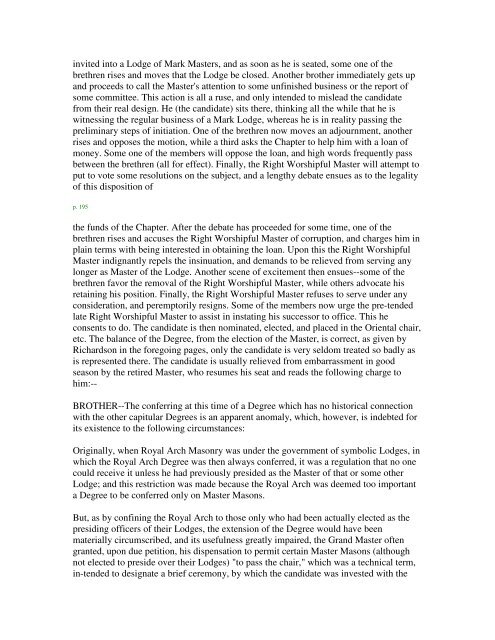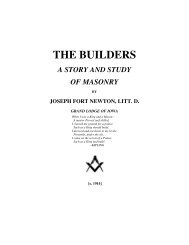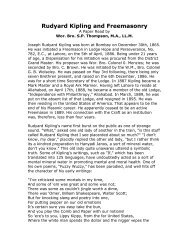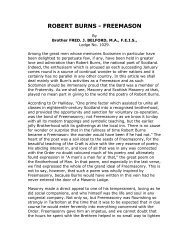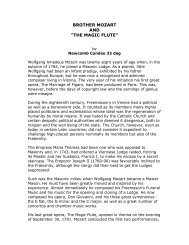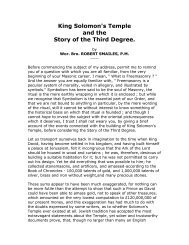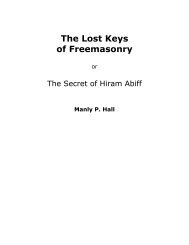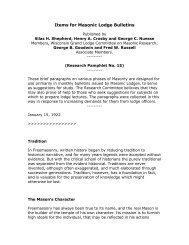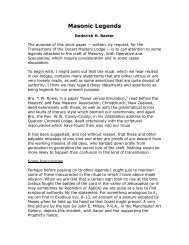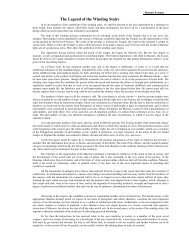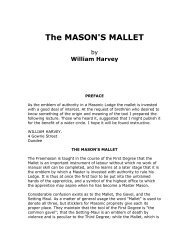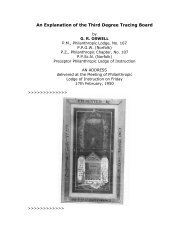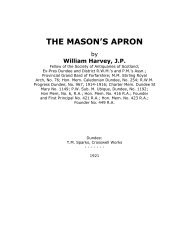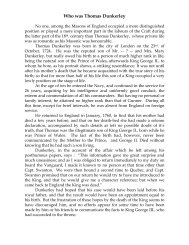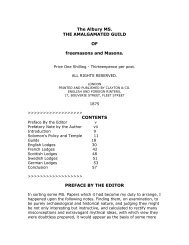Duncan's Masonic Ritual and Monitor - Rose Croix
Duncan's Masonic Ritual and Monitor - Rose Croix
Duncan's Masonic Ritual and Monitor - Rose Croix
Create successful ePaper yourself
Turn your PDF publications into a flip-book with our unique Google optimized e-Paper software.
invited into a Lodge of Mark Masters, <strong>and</strong> as soon as he is seated, some one of the<br />
brethren rises <strong>and</strong> moves that the Lodge be closed. Another brother immediately gets up<br />
<strong>and</strong> proceeds to call the Master's attention to some unfinished business or the report of<br />
some committee. This action is all a ruse, <strong>and</strong> only intended to mislead the c<strong>and</strong>idate<br />
from their real design. He (the c<strong>and</strong>idate) sits there, thinking all the while that he is<br />
witnessing the regular business of a Mark Lodge, whereas he is in reality passing the<br />
preliminary steps of initiation. One of the brethren now moves an adjournment, another<br />
rises <strong>and</strong> opposes the motion, while a third asks the Chapter to help him with a loan of<br />
money. Some one of the members will oppose the loan, <strong>and</strong> high words frequently pass<br />
between the brethren (all for effect). Finally, the Right Worshipful Master will attempt to<br />
put to vote some resolutions on the subject, <strong>and</strong> a lengthy debate ensues as to the legality<br />
of this disposition of<br />
p. 195<br />
the funds of the Chapter. After the debate has proceeded for some time, one of the<br />
brethren rises <strong>and</strong> accuses the Right Worshipful Master of corruption, <strong>and</strong> charges him in<br />
plain terms with being interested in obtaining the loan. Upon this the Right Worshipful<br />
Master indignantly repels the insinuation, <strong>and</strong> dem<strong>and</strong>s to be relieved from serving any<br />
longer as Master of the Lodge. Another scene of excitement then ensues--some of the<br />
brethren favor the removal of the Right Worshipful Master, while others advocate his<br />
retaining his position. Finally, the Right Worshipful Master refuses to serve under any<br />
consideration, <strong>and</strong> peremptorily resigns. Some of the members now urge the pre-tended<br />
late Right Worshipful Master to assist in instating his successor to office. This he<br />
consents to do. The c<strong>and</strong>idate is then nominated, elected, <strong>and</strong> placed in the Oriental chair,<br />
etc. The balance of the Degree, from the election of the Master, is correct, as given by<br />
Richardson in the foregoing pages, only the c<strong>and</strong>idate is very seldom treated so badly as<br />
is represented there. The c<strong>and</strong>idate is usually relieved from embarrassment in good<br />
season by the retired Master, who resumes his seat <strong>and</strong> reads the following charge to<br />
him:--<br />
BROTHER--The conferring at this time of a Degree which has no historical connection<br />
with the other capitular Degrees is an apparent anomaly, which, however, is indebted for<br />
its existence to the following circumstances:<br />
Originally, when Royal Arch Masonry was under the government of symbolic Lodges, in<br />
which the Royal Arch Degree was then always conferred, it was a regulation that no one<br />
could receive it unless he had previously presided as the Master of that or some other<br />
Lodge; <strong>and</strong> this restriction was made because the Royal Arch was deemed too important<br />
a Degree to be conferred only on Master Masons.<br />
But, as by confining the Royal Arch to those only who had been actually elected as the<br />
presiding officers of their Lodges, the extension of the Degree would have been<br />
materially circumscribed, <strong>and</strong> its usefulness greatly impaired, the Gr<strong>and</strong> Master often<br />
granted, upon due petition, his dispensation to permit certain Master Masons (although<br />
not elected to preside over their Lodges) "to pass the chair," which was a technical term,<br />
in-tended to designate a brief ceremony, by which the c<strong>and</strong>idate was invested with the


